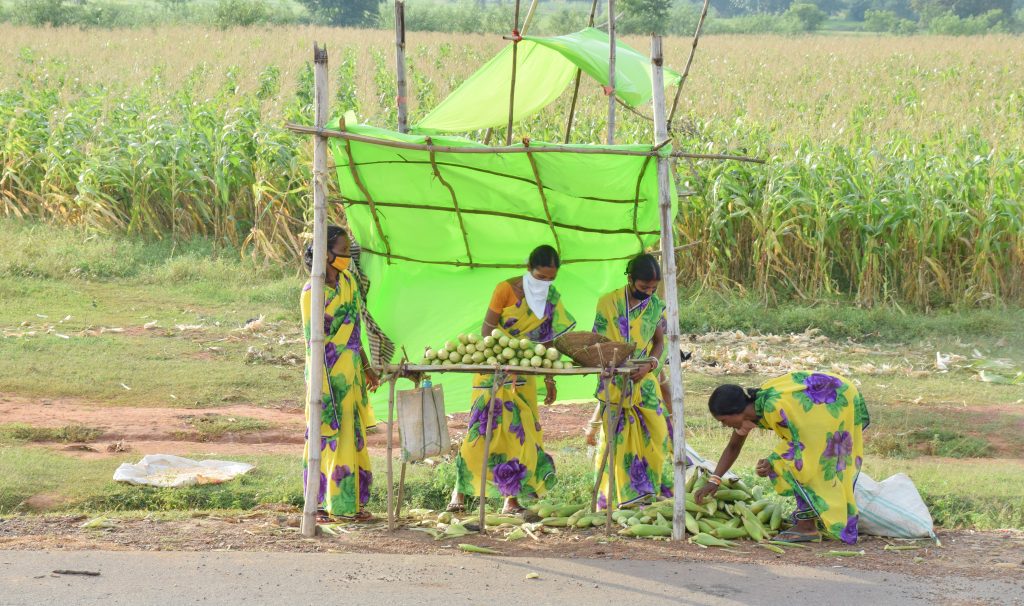Empowered rural women take on entrepreneurship- Odisha, India
Women in Odisha, India, successfully shoulder responsibility in leading their families through the COVID-19 crisis.

Sashimoni Lohar, a fifty-three-year-old from Badbil village, in Odisha, is like any other woman you would encounter in India’s rural heartlands. Her life is mostly confined within the boundaries of her home and farm.
The COVID-19 lockdown has been hard on people across India, but particularly agonizing for families like Lohar’s. Both her sons lost their jobs as laborers, one in a town near home, and the other in a city in a different state. Her younger son Debodutta, a migrant laborer stuck in the southern Indian city of Bengaluru when the midnight lockdown was announced, managed to survive and returned home two months later, aggrieved and penniless. Her husband remained the only earning family member, though on a meager salary, and the family dreaded not only the virus but hunger, as the small reserve of income and rations they had was coming to an end.
Lohar was the only one who refused to give up hope. With support from her village self-help group (SHG), she cultivated two acres of hybrid maize this year. The income generated through selling the crop at a roadside stall next to her farm ensured the wellbeing of her family in this critical period. For a brief time, along with her husband’s small income, she became the provider for the family with seven mouths to feed during the lockdown.
Lohar did worry for her jobless sons’ futures but believed that as a successful maize farmer with the skills acquired in the last few years, she can do even better. “Maize farming has supported us during this low-income and very critical period. I shall continue maize cultivation and hope to increase our lease in land next year,” said a visibly triumphant Lohar.
Investing in maize
Today, along with her husband and a new-found entrepreneurial spirit, she hopes to keep Debodutta and her older son closer to home. After lockdown restriction were eased, she invested about Rs.12,000 (roughly US$165) into maize cultivation and set up two stalls by the national highway next to the farm to sell green maize cobs again alongside her family. They made back almost double their investment from less than one acre and she plans to keep the excess as dry grain for the poultry feed mill. A budding entrepreneur full of confidence, Lohar now plans to start a small grocery shop with a loan in the coming months.
A few years ago, many women from these tribal areas in Odisha did not even step out of their houses and villages. They were reluctant to go to the market or the bank – anywhere away from the familiarity of their home. Today, through the opportunities afforded by government economic development programs and collaborations such as the one with the International Maize and Wheat Improvement Center’s (CIMMYT) Cereal Systems Initiatives for South Asia project (CSISA) these women have established themselves as successful maize farmers and entrepreneurs.

Lohar is just one of many women in the rural villages of Odisha — particularly in Mayurbhanj district where COVID-19 has left many male family members jobless — who either individually or in groups erected about 27 small stalls adjacent to their maize fields to sell green cobs to travelers on the highway. Many are very confident and determined to support and lead their families through this difficult time.
Engaging tribal groups
Mayurbhanj is a district in Odisha where nearly 58.7 percent of the population are from tribal groups. During the kharif — autumn, monsoon and cultivation — season, thousands of hectares of upland are left fallow, due to lack of education and knowledge and tribal farmers’ low risk-bearing capacity. CSISA began working in the district in 2013, improving farming systems for higher yields and providing sustainable livelihood options for tribal farmers.
From 2013 to 2020, CSISA, in collaboration with the State Department of Agriculture, Department of Horticulture, NGO partners, private seed companies, women SHG federations and the Integrated Tribal Development Agency (ITDA), helped develop maize cultivation as an important part of the tribal people’s livelihoods. Thousands of hectares of fallow lands are now being converted to cultivate maize, focusing on sustainable agriculture and livelihoods, predominantly involving women as most men were occupied or engaged in migrant jobs. This year alone, more than 100 tribal women from Badbil village have cultivated approximately 120 acres of commercial hybrid maize.
CSISA supports the farmers all the way from sowing to crop harvesting. To strengthen dry grain marketing and to avail the benefits of different schemes under the government of Odisha’s support for farmer producer groups (FPGs), CSISA has formed two women’s FPGs in Badbil alone. Some of the SHGs working with CSISA on maize cultivation in the region in the last four-five years include Maa Jagat Janani, Johar Jaher Aya, Biswa Jay Maa Tarini, Maa Saraswati, Subha Patni, and Maa Brundabati.
The women from the villages in Mayurbhanj have become well-known, both within and outside the district, for their good quality green cobs and marketing intelligence. These women had the courage to change their circumstances and lifted their families out of situations of uncertainty and hardship. The rows of industrious rural women selling maize by the national highway became national news, and many of the state’s media channels that come to cover this story hailed their determination and capacity for income generation, even in a pandemic, as symbols of women’s empowerment in the tribal community.
Also available in CIMMYT’s site: https://www.cimmyt.org/news/empowered-rural-women-take-on-entrepreneurship/
Tags: #COVID-19, #Entrepreneurship, #Odisha, #RuralWomenFarmers
